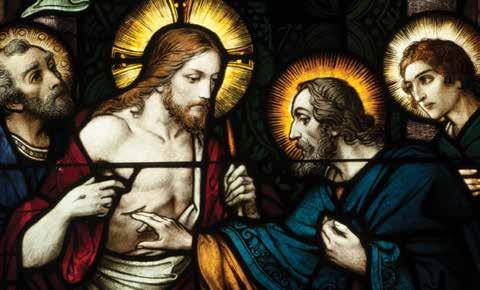
3 minute read
Questions of Faith
Comment
Father Wilmer Todd
Losing faith in God?
My younger teenage brother has told me he doesn’t believe in God anymore. I know he hasn’t told our parents, and he’s still going to Mass and Communion with us. What should I do?
The simplest and most honest answer is to continue to love your brother and to try to understand what is happening to him in his life. Most of us received the faith from our parents and from our religious education classes. At some point, we have to take responsibility for our own personal faith, and to state our own belief in God and the divine plan for humanity.
To come to this acceptance, we have to ask ourselves a lot of questions: Does God really exist? Did the world come into existence in six days or over millions of years? Are the stories in the Bible true? Did humans evolve over time or were we created instantly in a garden? If God exists, why do so many innocent people have to suffer? These are just some questions that we have to come to grips with today.
Questioning and doubting are not bad. The church has always proclaimed John’s Gospel of “doubting Thomas” on the Sunday after Easter. When we read the Gospels, it was not only Thomas who had some reservations about the risen Christ. In practically every account of Jesus’ resurrection appearances, the disciples were amazed, terrified or thought they were seeing a ghost. They did not understand that Jesus would rise again with an entirely new body.
The apostle Thomas may be the patron saint of doubters, but the Gospel story does not condemn him for his doubt. Rather, it uses his need for proof to make a point about faith. Jesus says, “Blessed are those who have not seen and have believed.” Those who have followed Christ in faith through the ages without the benefit of “seeing” him are blessed.
When we look at Thomas’ life-story, we see that despite his momentary doubts he follows through and becomes a model apostle. He did not run out of the room when Jesus came back. He stayed with his community of believers. He stumbled, but he got up again. Later, he went off to preach the Gospel as Jesus commissioned him to do. He became a martyr, and was beheaded by the king in India where he had brought the faith to others. Doubting Thomas became St. Thomas.
Everyone has doubts whether we want them or not. Endless doubt can harm our faith, but healthy doubt can lead to an even deeper faith. Look at Thomas. Although he doubted, Thomas stayed with the others. Instead of trying to banish our doubts, we should learn from them, and let them strengthen our faith. Doubt may be a wound, but it is a wound that can be healed.
Like Thomas, your brother is staying with the community of faith by attending Mass and receiving Communion. That’s a good thing. In the Eucharist he is encountering the risen Lord. Ask Jesus to speak to him in a special way. Pray for his healing and renewed strength.
If he talks to you about a particular problem dealing with his reluctance to believe in God, lead him to explanations of how and why the Bible was written. It’s a religious book and not a scientific explanation of reality. Evolution and the Bible can go hand and hand.
Many great saints throughout history have experienced dark nights of the soul. Even St. Teresa of Calcutta revealed her doubts. Where do we fit in? Is it possible for a believer to doubt?
The fact that you are reading this article suggests that at some level you believe, but at the same time, you might question some of our beliefs. Perhaps the prayer of the father who brought his possessed son to Jesus would be an honest and fitting prayer for us all. The father said to Jesus, “I believe, Lord. Help my unbelief” (Mark 9:24). BC










